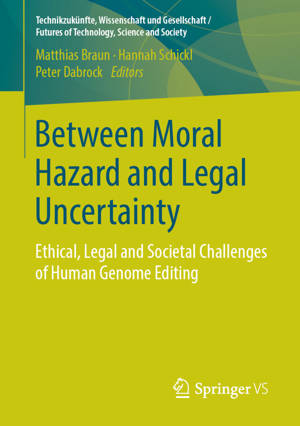
Bedankt voor het vertrouwen het afgelopen jaar! Om jou te bedanken bieden we GRATIS verzending (in België) aan op alles gedurende de hele maand januari.
- Afhalen na 1 uur in een winkel met voorraad
- In januari gratis thuislevering in België
- Ruim aanbod met 7 miljoen producten
Bedankt voor het vertrouwen het afgelopen jaar! Om jou te bedanken bieden we GRATIS verzending (in België) aan op alles gedurende de hele maand januari.
- Afhalen na 1 uur in een winkel met voorraad
- In januari gratis thuislevering in België
- Ruim aanbod met 7 miljoen producten
Zoeken
Between Moral Hazard and Legal Uncertainty
Ethical, Legal and Societal Challenges of Human Genome Editing
€ 99,45
+ 198 punten
Omschrijving
Genome Editing Techniques are seen to be at the frontier of current research in the field of emerging biotechnologies. The latest revolutionary development, the so-called CRISPR technology, represents a paradigmatic example of the ambiguity of such techniques and has resulted in an international interdisciplinary debate on whether or not it is necessary to ban the application of this technique by means of a moratorium on its use for human germline modifications, particularly in human embryos in the reproduction process. However, given that other germline engineering techniques like mitochondrial (mt) DNA transfer techniques are already permitted and applied, the question arises what lies at the root of the apparent social unease about the modification of the human germline by Genome Editing Techniques like CRISPR. Against this background, the book seeks to make a substantial contribution to the current debate about a responsible and participatory framework for research on emerging biotechnologies by analysing underlying perceptions, attitudes, arguments and the reasoning on Genome Editing Techniques.
Specificaties
Betrokkenen
- Uitgeverij:
Inhoud
- Aantal bladzijden:
- 225
- Taal:
- Engels
- Reeks:
Eigenschappen
- Productcode (EAN):
- 9783658226596
- Verschijningsdatum:
- 21/11/2018
- Uitvoering:
- Paperback
- Formaat:
- Trade paperback (VS)
- Afmetingen:
- 148 mm x 210 mm
- Gewicht:
- 285 g

Alleen bij Standaard Boekhandel
+ 198 punten op je klantenkaart van Standaard Boekhandel
Beoordelingen
We publiceren alleen reviews die voldoen aan de voorwaarden voor reviews. Bekijk onze voorwaarden voor reviews.








